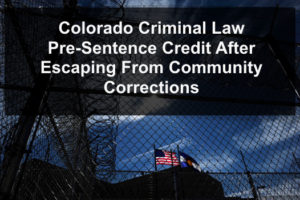Colorado Criminal Law – Pre-Sentence Credit After Escaping From Community Corrections
By H. Michael Steinberg Colorado Criminal Defense Lawyer – Attorney
 Colorado Criminal Law – Pre-Sentence Credit After Escaping From Community Corrections – If you walk away from your direct sentence community corrections program – do you receive pre-sentence credit for the time you have spent “in residence?”
Colorado Criminal Law – Pre-Sentence Credit After Escaping From Community Corrections – If you walk away from your direct sentence community corrections program – do you receive pre-sentence credit for the time you have spent “in residence?”
This brief article answers that question
The Typical Scenario – Escape From Community Corrections
Pre-Sentence Confinement Credit is very important in calculating how much time remains on a Colorado Department of Corrections sentence after an escape charge results in an inmates “rejection after acceptance” from the community corrections system.
The typical case involves a Judge sentencing a convicted felon to a period of time – let’s say eighteen months – in a community corrections program. After spending time in the residential portion of the sentence, the inmate walks away or “escapes.”
Following the escape, the Defendant is apprehended “re-sentenced” to the eighteen months in a a facility in the Department of Corrections system.
It is clear that any time spent in county jail waiting for a bed is added into the presentence credit calculation. The issue is this: How much time must be awarded as presentence credit for time spent in the community corrections system?
The Law – Calculating Presentence Credit For Time Spent In A Colorado Community Corrections Program Following An Escape
A key statute governing this area of law is Section 18-1.3-301(1)(k). Under this law a Defendant was not entitled to certain types of credit while in a community corrections program if they escape.
Section 18-1.3-301(1)(k) – Authority to Place Offenders in Community Corrections Programs
……….
(k) Any offender who escapes from a residential community corrections program or who absconds from a nonresidential community corrections program shall forfeit any time credit deductions earned pursuant to paragraph (i) of this subsection (1) and shall not be credited with any time on escape or absconder status.
Within thirty-five days after an offender’s escape or abscondment, the program administrator shall submit to the sentencing court a statement on the form described in subparagraph (III) of paragraph (i) of this subsection (1) of the time credit deductions that would have been earned by the offender.
[HMS – Subsection (i) of Subsection (1) reads:]
…
(i) (I) An offender sentenced directly to a community corrections program by the sentencing court pursuant to this subsection (1) shall be eligible for time credit deductions from the offender’s sentence not to exceed ten days for each month of placement upon a demonstration to the program administrator by the offender that the offender has made consistent progress in the following categories:
(A) Maintenance of employment, education, or training, including attendance, promptness, performance, cooperation, care of materials, and safety;
(B) Development and maintenance of positive social and domestic relations;
(C) Compliance with rules, regulations, and requirements of residential or nonresidential program placement;
(D) Completion and compliance with components of the individualized program plan; and
(E) Demonstration of financial responsibility and accountability.
(II) The administrator of each community corrections program shall develop objective standards for measuring progress in the categories listed in subparagraph (I) of this paragraph (i), shall apply such standards consistently to evaluations of all such offenders, and shall develop procedures for recommending the award of time credits to such offenders.
(III) The administrator of each community corrections program shall review the performance record of each offender directly sentenced to such program. Such review shall be conducted at intervals to be determined by each program administrator. Such reviews shall be conducted at least once every six months, but may be conducted at more frequent intervals as determined by the program administrator. If the program administrator determines that the offender engaged in criminal activity during the time period for which the time credits were granted, the program administrator may withdraw the time credits granted during such period.
Prior to the time of the offender’s release, the program administrator shall submit to the sentencing court the time credit deductions granted, withdrawn, or restored consistent with the provisions of this paragraph (i). Such time credit deductions shall be submitted on standardized forms prepared by the division of criminal justice of the department of public safety that include verification by the program administrator that the time credit deductions are true and accurate. The sentencing court shall certify such time credit deductions as part of the offender’s permanent record. Any time credits authorized under this paragraph (i) shall vest upon certification of time credit deductions by the sentencing court at the time of the offender’s release from the program.
(IV) An offender shall not be credited with more than one-half the allowable time credits for any month or portion thereof unless the offender was employed, was unable to be employed due to a disability waiver, or was participating in training, education, or treatment programs which precluded the ability to remain employed. This subparagraph (IV) shall not apply to those cheap levitra from india offenders excused from such employment or training by the program administrator or for medical reasons.
(V) No time credit deductions shall be granted to any offender for time spent in jail, whether awaiting sentencing, placement in the program, disciplinary action, or as a result of a subsequent arrest, unless such time spent in jail was a prearranged component of the offender’s individualized program plan and the offender has made consistent progress in the categories listed in subparagraph (I) of this paragraph (I).
The Rule – “Limits On An Individual’s Liberty – Section 18-1.3-405
A person…
“is entitled to credit against the term of his or her sentence for the entire period of such confinement,” and
“[a]t the time of sentencing, the court shall make a finding of the amount of presentence confinement to which the offender is entitled and shall include such finding in the mittimus.”
§ 18-1.3-405, C.R.S. .
ANY Time spent by a Defendant in jail, in a Department of Corrections facility, or as a resident in a community corrections facility constitutes confinement under section 18-1.3-405, because those facilities limit an individual’s liberty.
If an inmate is serving the “residential portion” of their community corrections direct sentence and that sentence is revoked, they are entitled to presentence credit for time served when they are in the community corrections facility but NOT for time served in the but not for time served in nonresidential placement. See §§ 17-27-104(9), 18-1.3-301(1)(j), C.R.S..
Section 18-1.3-301(1)(k) takes away only certain types of presentence credit – it is the kind of credit earned in Section (i) provides that:
“[a]ny offender who escapes from a residential community corrections program or who absconds from a nonresidential community corrections program shall forfeit any time credit deductions earned pursuant to paragraph (i) of this subsection (1) and shall not be credited with any time on escape or absconder status.”
Again only credits earned pursuant to section 18-1.3-301(1)(i) are forfeited. This kind of credit includes such time credits as
Although not delineated as such, the time credits as “good time” and “earned time” credits awarded by the community corrections program, but Section 18-1.3-301(1)(k) does not apply to awards of actual presentence credit confinement because there is an actual loss of liberty while serving the residential portion of a community corrections sentence.
Colorado Criminal Law – Pre-Sentence Credit After Escaping From Community Corrections
If you found any of the information I have provided on this web page article helpful please click my Plus+1 or the Share buttons for Twitter and Facebook below so that others may also find it.
The reader is admonished that Colorado criminal law, like criminal law in every state and at the Federal level, changes constantly. The article appearing above was accurate at the time it was drafted but it cannot account for changes occurring after it was uploaded.
If, after reading this article, you have questions about your case and would like to consider retaining our law firm, we invite you to contact us at the Steinberg Colorado Criminal Defense Law Firm – 303-627-7777.
Never stop fighting – never stop believing in yourself and your right to due process of law. You will not be alone in court, H. Michael will be at your side every step of the way – advocating for justice and the best possible result in your case. H. Michael Steinberg is passionate about criminal defense. His extensive knowledge and experience of Colorado Criminal Law gives him the edge you need to properly handle your case
 ABOUT THE AUTHOR: H. Michael Steinberg – Email The Author at:
ABOUT THE AUTHOR: H. Michael Steinberg – Email The Author at:
A Denver Colorado Criminal Defense Lawyer – or call his office at 303-627-7777 during business hours – or call his cell if you cannot wait and need his immediate assistance – please call 720-220-2277.
“A good criminal defense lawyer is someone who devotes themselves to their client’s case from beginning to end, always realizing that this case is the most important thing in that client’s life.”
You should be careful to make a responsible choice in selecting a Colorado Criminal Defense Lawyer. We encourage you to “vet” our firm. Over the last 40 plus years – by focusing ONLY on Colorado criminal law – H. Michael has had the necessary time to commit to the task of constantly updating himself on nearly every area of criminal law, to include Colorado criminal law and procedure and trial and courtroom practice.
Putting more than 40 years of Colorado criminal defense experience to work for you.
H. Michael works hard to get his clients the best possible results in and out of the courtroom. He has written, and continues to write, extensively on Colorado criminal law and he hopes this article helps you in some small way – Colorado Criminal Law – Pre-Sentence Credit After Escaping From Community Corrections.
Comments Off on Colorado Criminal Law – Pre-Sentence Credit After Escaping From Community Corrections | Community Corrections - Escape From, Presentence credti





























